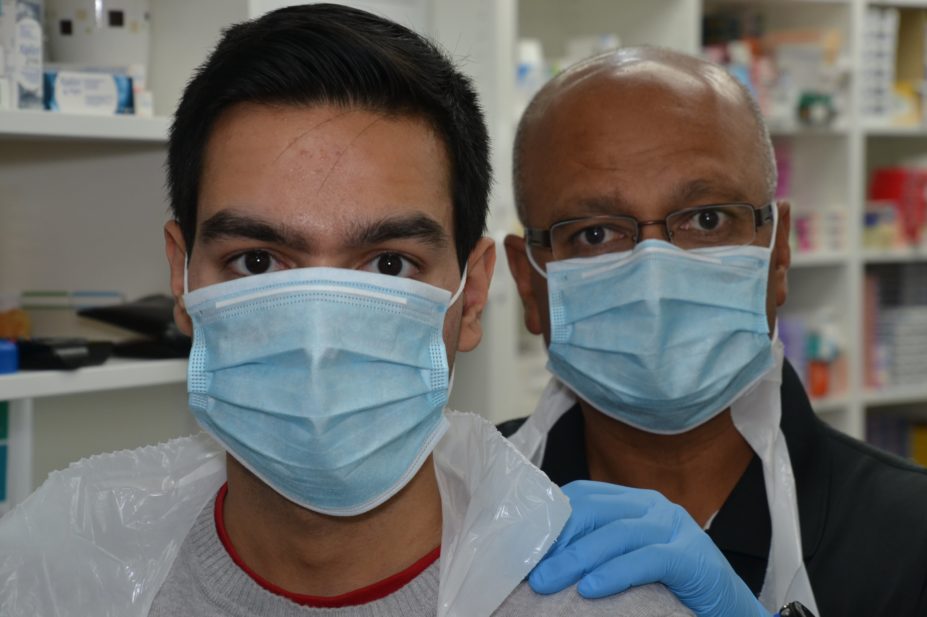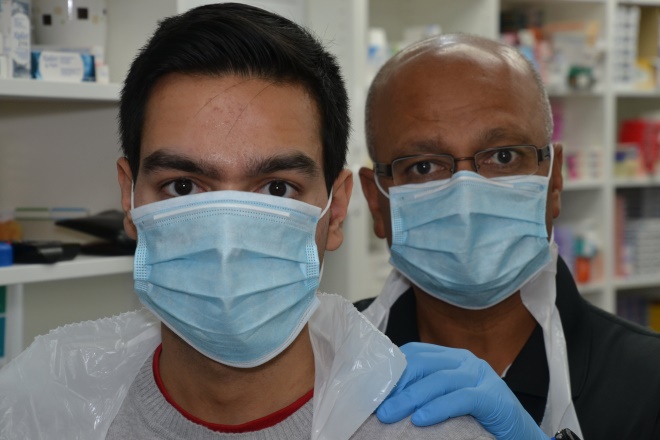
Mclean
Open access article
The Royal Pharmaceutical Society has made this article free to access in order to help healthcare professionals stay informed about an issue of national importance.
To learn more about coronavirus, please visit: https://www.rpharms.com/resources/pharmacy-guides/wuhan-novel-coronavirus

Source: Mclean
Personal protective equipment, including masks, gloves and aprons have been sent to pharmacies, but confusion exists over when it should be worn
When Public Health England (PHE) published its guidance on the use of personal protective equipment (PPE) during the COVID-19 pandemic on 2 April 2020, pharmacy’s representative bodies thought the battle had been won.
They — the Pharmaceutical Services Negotiating Committee (PSNC) and Royal Pharmaceutical Society (RPS), to name just two — believed that government officials had finally recognised the danger being faced by pharmacy teams on the frontline of the pandemic, who are exposed to hundreds of patients every day. Pharmacy teams who work in small spaces, well within two metres — the social distancing measure prescribed by the government — of colleagues in even smaller dispensaries.
A lack of access to testing has meant the prevalence of COVID-19 in the community is unknown, further increasing anxiety that many patients or members of staff could be unwittingly spreading the virus.
Short-sighted guidance
Since March 2020, the use of PPE in pharmacies had been based on NHS England’s standard operating procedure (SOP) for community pharmacy, which recommended that PPE should only be used for “close patient contact, within two metres,” but added that pharmacy staff should “avoid close patient contact at this time”.
“There are few occasions where it is expected that staff will be required to wear PPE in the pharmacy setting,” the SOP, published on 22 March 2020, said.
But guidance issued by PHE just over a week later gave a broader recommendation that: “If social distancing is not maintained, though, direct care is not provided, sessional use of fluid-resistant surgical masks (FRSMs) is recommended.”
In many pharmacies it is also not possible for staff to maintain a social distance of two metres
The PSNC welcomed the advice, saying: “The guidance reflects the fact that [SARS-CoV-2] is now widespread in the community, meaning clinicians are more likely to see patients with the virus, some of whom may have minimal or no symptoms.”
“In many pharmacies it is also not possible for staff to maintain a social distance of two metres, so even though direct care may not be being provided to a patient, in these circumstances use of a FRSM is recommended.”
The RPS also updated its guidance on PPE use, advising pharmacists who “are not able to maintain a social distance of two metres at all times (from patients and other staff)” to wear FRSMs.
But confusion was introduced when — eight days after the updated PPE guidance was published — PHE changed its official advice again to say that FRSM should only be used “for contact with possible or confirmed cases of COVID-19” (see Box).
In a webinar a few days before, Susan Hopkins, national incident director for COVID-19 at PHE, had hinted at the change to come.
Those staff are not recommended to wear masks. We recommend people stay out of work if they’re unwell
She said that PHE was “not recommending those who do not have frontline contact, with individuals who may be sick, to wear masks.” She added that this applied even in a small dispensary with staff working together in the back who may be passing on the disease: “Those staff are not recommended to wear masks. We recommend people stay out of work if they’re unwell.”
A letter from NHS England, sent on 14 April 2020, went even further. “It would be extremely helpful,” the letter said, to protect supplies to pharmacies and other healthcare professionals, if pharmacies limited staff contact with the public “to help manage the use of masks and maintain availability”.
Ignoring guidance
The change in advice provoked some sharp comments from pharmacy leaders, who pointed out pharmacy staff were risking COVID-19 infection for themselves and their families every day in community pharmacy.
Following Hopkins’ comments, the PSNC told The Pharmaceutical Journal that it was “very concerned about the potential confusion” and that it disagreed with the advice given: “We believe that [the PHE guidance] is ambiguous,” it said, adding that it had raised the issue with the pharmacy minister, Jo Churchill.
Sandra Gidley, president of the RPS, said she was also “very concerned” about the clarity of the guidance.
“We at the RPS are very clear and stand by our advice; everyone working in frontline pharmacy who is not able to maintain two metres social distance from either patients and the public, or other staff members, is recommended to wear FRSMs,” she said, adding that PPE should be “available free of charge” to all community pharmacy teams.
Gidley added that wholesalers have supplied pharmacies in Scotland with two boxes of masks, while pharmacies in Wales have also been given PPE. However, she added that the RPS plans to monitor “ongoing supply” in both countries.
Community Pharmacy Wales believes that pharmacy staff should be wearing masks all of the time
Community Pharmacy Wales also said it was concerned by the updated guidance as “there is a significant number of reports in relation to asymptomatic patients”.
“Pharmacy teams have concerns that — particularly in small dispensaries — although steps are being made to maintain some element of social distancing, it is not possible to do so anywhere near all of the time,” they said.
“Community Pharmacy Wales believes [that pharmacy staff] should be wearing masks all of the time.”
But, for some pharmacies, the controversy over the guidance is academic.
Raj Matharu, chair of Pharmacy London — a representative body for London’s local pharmaceutical committees — said he was still recommending pharmacies follow the PSNC and RPS advice on when to use FRSMs “because we can’t have social distancing in our pharmacies”.
“Wearing masks and gloves provides some protection and is reassuring for staff members, who are really frightened at the moment, otherwise they will stop coming into work,” he said.
However, he added that pharmacies still “can’t get hold of PPE”.
Pharmacies were initally sent packs of PPE by NHS England in early March 2020. These packs included 200 aprons, 100 pairs of examination glove and 50 FRSMs, and came with the option of ordering further supplies through the National Supply Disruption line, although pharmacists have since been struggling to maintain their stocks.
During the webinar, Hopkins admitted that “masks are in short supply”.
“This is a global supply chain issue, where we have buying and purchasing of massive amounts of supply, and the pandemic stockpile — which is there to help us in a crisis — has actually been doing more than that,” she explained.
“It has been helping us where the global supply chain is not as easy to access as it was, particularly because large parts of Asia’s manufacturing economy has closed down for the past few months and has only just started to get going again.”
To mitigate PPE supply issues to frontline healthcare workers, and arguably to head off some of the criticism it has received over the issue, the government set out a three-point ‘COVID-19: PPE plan’ that will see manufacturers, including Rolls Royce and McLaren, make PPE within the UK.
Under the new plan, which launched on 10 April 2020, pharmacies will be expected to order and cover the costs of additional PPE from wholesalers. However, whether wholesalers will be able to supply the equipment remains to be seen.
Supplying demand
Wholesalers have reported receiving differing amounts of PPE to sell to pharmacies in the UK. Phoenix Medical told The Pharmaceutical Journal on 9 April 2020 that it had received “a significant amount of PPE from the government reserve” to sell to community pharmacy only.
AAH Pharmaceuticals said it had just received “limited stocks” of masks and was seeking clarity from the government on whether further supplies would be available.
There is enough PPE to go around, but it’s a precious resource and must be used only where there is a clinical need to do so
In addition to improving manufacturing and distribution, the government’s new approach also highlights the need for clarity over who requires PPE “and who does not, based on UK clinical expertise and World Health Organization standards”.
“There is enough PPE to go around, but it’s a precious resource and must be used only where there is a clinical need to do so,” the plan says.
However, Graham Phillips, superintendent pharmacist of Manor Pharmacy Group, said his pharmacies “can’t find PPE”, despite trying to buy it for weeks.
“We are getting nothing: no support, no PPE. I haven’t words to describe my frustration,” he said.
“We put up as much protection as we can. We’re trying to practice as much social distancing as we can, but the idea that you can do that in a community pharmacy is just — I mean, come and work in one,” he said, adding that the PPE guidance has been “based on an armchair view of what community pharmacy is and does”.
Ade Williams, superintendent pharmacist at Bedminster Pharmacy in Bristol, said his pharmacy has already taken steps “beyond the current guidance” to protect staff, including wearing 3D-printed visors donated by the local community and constructing acrylic glass shields.
Williams said he has followed guidance from the Health and Safety Executive, which “mandates that we [employers] have a legal responsibility to do everything we can to protect our team”.
“While the PHE guidance is supposed to be evidence led, I became aware of all the steps that could be taken that went beyond the guidance, [and] I felt it was only morally expected of me to try and put those things in place,” he explained.
So, while those at the top are confused and concerned by the guidance, those on the frontline have already taken matters into their own hands to stay safe and open for patients.
“For the individuals that are here, how they feel about their safety is directly linked to how they feel about their value,” said Williams. “If you feel undervalued, you’re more likely to keep asking yourself, why am I putting myself in this situation day in and day out?”
Box: What is the official advice on personal protective equipment?
Updated Public Health England (PHE) guidance advises pharmacy teams:
- Not to wear personal protective equipment if two metres social distancing can be maintained;
- Wear fluid-resistant surgical masks (FRSMs) if social distancing is not maintained when in contact with possible or confirmed cases of COVID-19;
- FRSMs should be worn for one session each — a morning or an afternoon — due to the short supply;
- Susan Hopkins, national incident director for COVID-19 at PHE clarified that FRSMs should be “worn until damp”, which “can usually take three to four hours, but can be up to eight hours depending on how heavy your breathing is and how hot the environment is”.
You may also be interested in

Norovirus and strategies for infection control

Case-based learning: insect bites and stings
